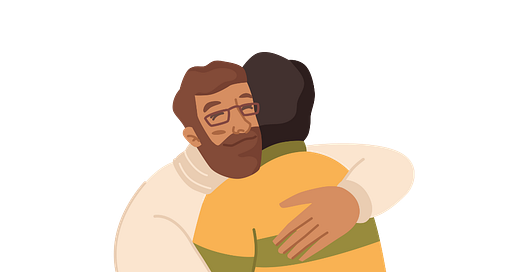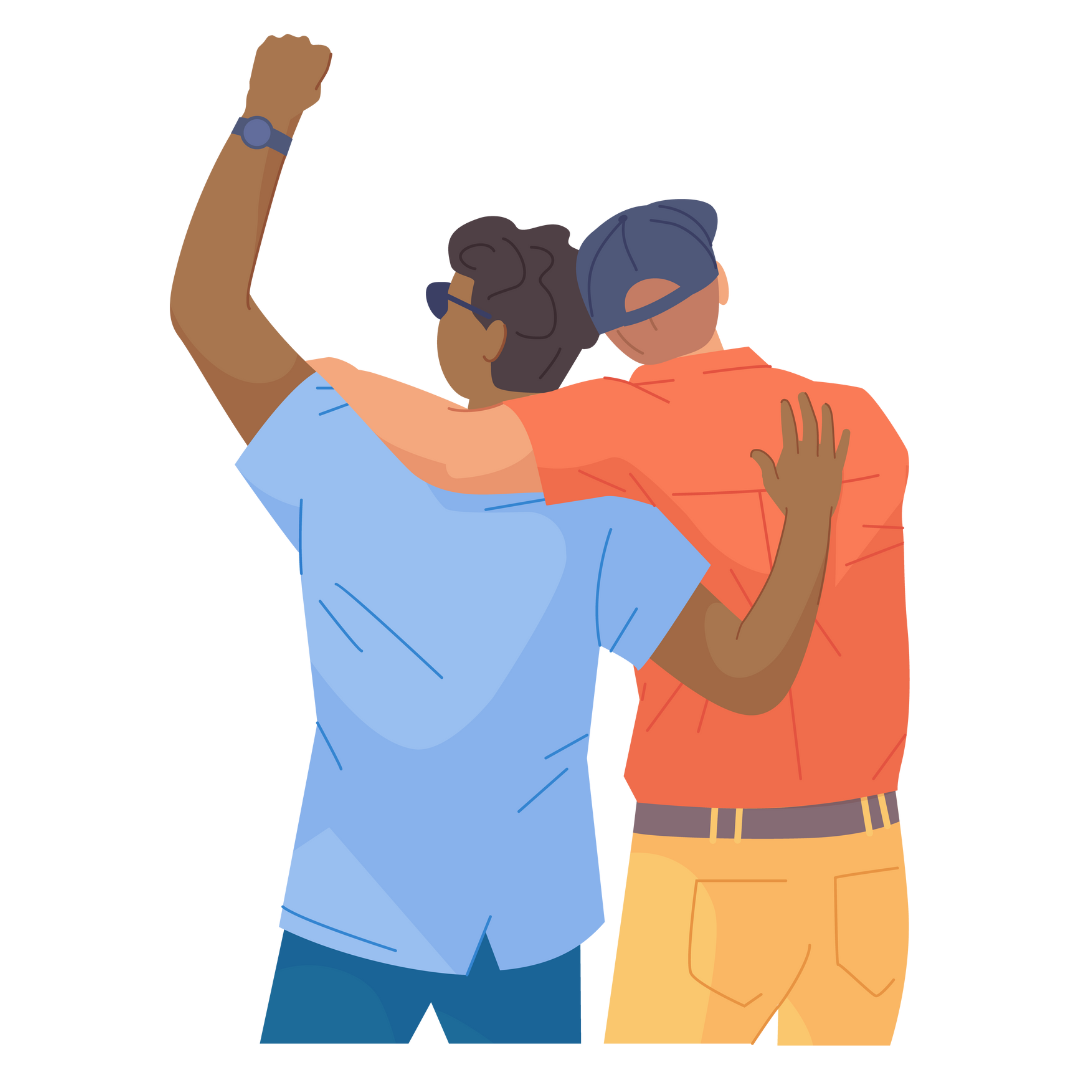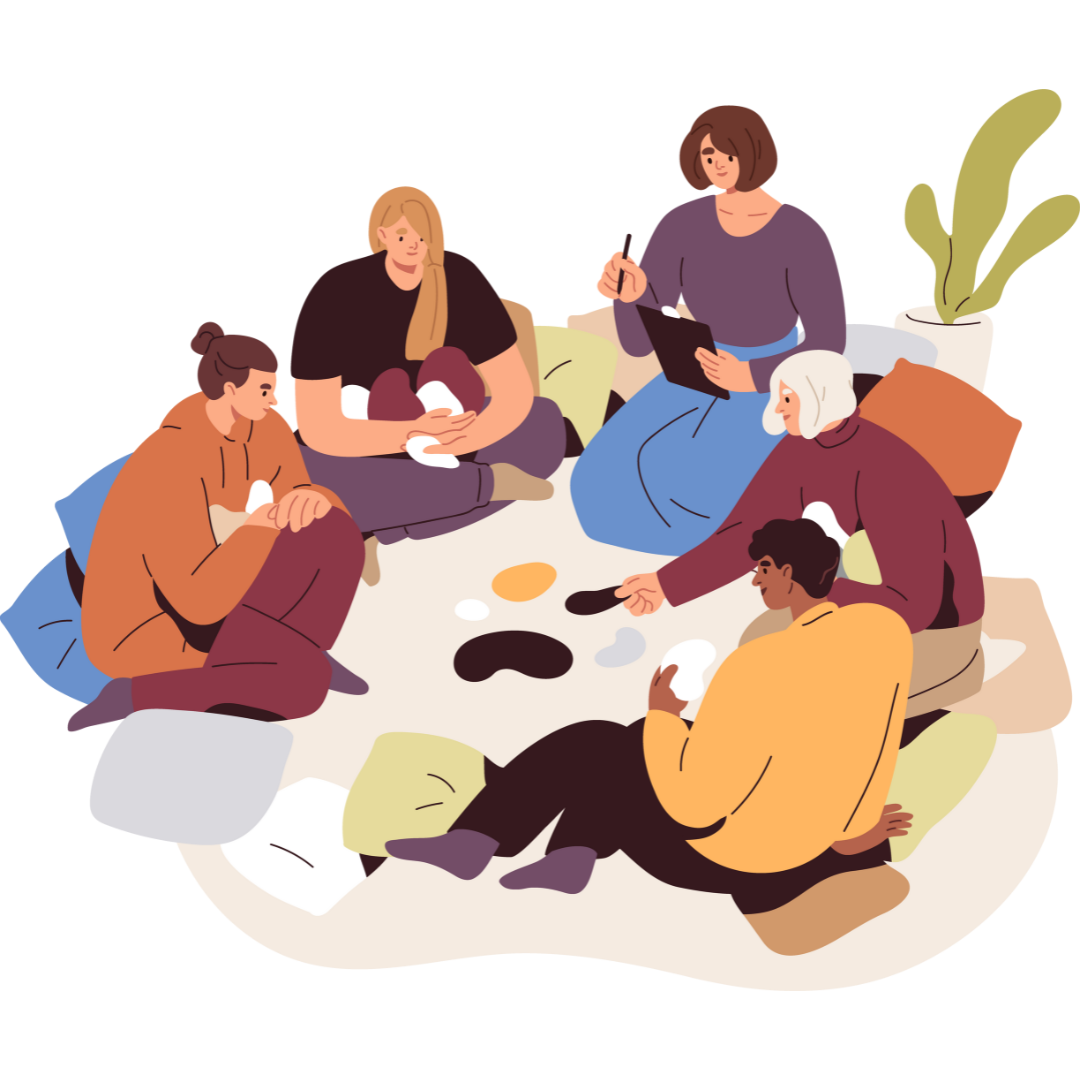Men Performing Masculinity, Convo #1
A conversation with the self featuring Make Men Emotional Again author (and Therapist!) Jeremy Mohler
Hello lovely reader! Over the next few months, in (roughly) bi-weekly intervals, I will be publishing a conversation I invited
, , and to have with themselves. I ask that you read these pieces through the lens discussed in the introduction piece Men Performing Masculinity and meet these wonderful men with empathy and grace. Thank you. 💜An introduction to Jeremy
[Copied from Jeremy’s about page]
I’m Jeremy Mohler (he/him), a therapist, men’s group leader, writer, and former communications strategist for the labor movement.
Years ago, a breakup hurt me so bad that I took a chance on going to therapy. I learned how to calm my anxiety, figure out what I really want in life, and—most importantly—be nicer to myself.
Along the way, I transitioned careers from marketing for Fortune 500 tech companies to fighting for economic and racial justice in statehouses and city halls nationwide—and then to being a therapist myself. I currently see clients and lead men’s groups from where I live in Baltimore, Maryland.
From my days working in labor politics, I bring a particular lens to men’s work. I’m influenced by feminists like Silvia Federici, Nancy Fraser, and Keeanga-Yamahtta Taylor who blame capitalism for many of society’s issues. I’m curious about how capitalism has distorted our ideas about gender. I believe a different, fairer, safer, healthier way of organizing society is possible—but only through, as Martin Luther King Jr. called it, a “radical redistribution of political and economic power.”
An introduction to Jeremy’s writing
[Excerpt from What does ‘positive’ masculinity look like?]
It’s not a coincidence that the “alpha males” on YouTube—and politicians like Donald Trump—want men to aspire to so-called “traditional masculinity.” The belief that men are naturally less emotional (and therefore women are more nurturing) is only a few hundred years old. It emerged in the early days of capitalism to fix a crisis caused by a world-altering shift in the organization of society. The new capitalist class in Western Europe first tried to force peasants—men, women, and children—to work long, grueling hours in their farms and factories. With no one to care for the home and raise children—which prior to capitalism was handled by sharing these duties communally—this new working class wasn’t able to produce enough workers for the fast-growing economy.
“The result was a crisis of [care work,] which prompted a public outcry and campaigns for ‘protective legislation,’” in the words of political philosopher Nancy Fraser. “Recasting [care work] as the province of women within the private family, [capitalism] invented the new, bourgeois imaginary of domesticity.” Working-class women were forced to stay at home to do unpaid household labor, while men were forced to focus on supporting the family by making money outside the home.
That’s where our “traditional” ideas about gender roles come from. They are a relatively recent invention and were initially meant to support and justify the rapid growth of capitalism. Then, over the last few hundred years, they were exported around the world by the British and American empires. From the Americas to Africa, indigenous societies were forced by colonization to adopt these “traditional” gender roles. Most indigenous peoples in what are now the Americas raised children collectively. Before the British colonized the Yoruba people in what is now known as Nigeria, Yoruba women held leadership positions and owned land. “Women could be at the same time rulers, mothers, children, priests, and occupy any position in social structures, depending on their situational status,” writes Nigerian scholar Oyeronke Oyewumi. “The imposition of the European economic system led to [women’s] exclusion from the public sphere. Women were forced into the household and became dependent on men.”
A conversation with the self:
When was the first moment that you can recall experiencing what bell hooks refers to as soul murder--when you socially need to behave in a way modeled by other boys/men in your environment that felt wholly against your inner-self/values?
I have to confess. I had to look up what bell hooks wrote about “soul murder.” I bought The Will to Change years ago, but I’ve yet to read it! A big part of what I’m trying to put into the world with my newsletter is showing that a man can be valuable and lovable to others even when he isn’t competent in every way and hasn’t read every book and doesn’t know everything.
I looked it up and here’s what hooks wrote, “Learning to wear a mask (that word already embedded in the term ‘masculinity’) is the first lesson in patriarchal masculinity a boy learns. He learns that his core feelings cannot be expressed if they do not conform to the acceptable behaviors sexism defines as male. Asked to give up the true self in order to realize the patriarchal ideal, boys learn self-betrayal early and are rewarded for these acts of soul murder.”
I’m certain there were moments before this, but a memory that’s been on my mind recently was a soccer practice when I was 12 years old. I’d taken a year off to focus on baseball, which I also enjoyed. This was my first practice back with my team. My old friends all seemed bigger and faster than me. They’d clearly developed their soccer skills, while I’d only gotten marginally better at baseball. They’d become closer as friends and barely acknowledged my presence. I felt so hurt and lonely, like an outcast.
But I couldn’t show any of that. Or at least it felt like I couldn’t. And that’s the “soul murder” part. My friends didn’t ask me how I was doing. I don’t remember any adult—the coach or my parents—checking to see how I felt. I had to keep all those messy feelings inside. I had to manage my emotional pain on my own.
This reaffirmed a belief I’d picked up somewhere along the way as a young boy: I couldn’t admit that I wanted to be closer with my friends. That would mean I was “soft,” “girly,” or “gay.” I had to act stoic, like everything was fine, even if I was starving for love and connection inside.
What happened was I unconsciously told myself that my old friends didn’t like me anymore because I wasn’t as good at soccer. I determined to never allow myself to be in that position again. From then on, I would try really hard to appear competent so I wouldn’t ever feel lonely and unwanted.
Again, all of this was happening unconsciously. It was only recently that I connected my adult behavior with this childhood memory.
A few weeks ago, I was interviewed on a podcast. The morning before the interview, I was so nervous about not knowing enough about what I was being asked to talk about. I took 30 minutes and sat quietly on my couch with my eyes closed. I felt into the nervousness, which was showing up as tension in the back of my neck.
After a few minutes, I was back at that soccer practice. I saw my 12-year-old self, walking around the field aimlessly, kicking clumps of grass. I told him I felt bad for him being all alone out there. I told him that he never has to pretend like he knows everything again—that he can hang out with me now, in the present. I showed him how it’s different in my adult life: When I admit that I don’t know something, it actually allows people to like me more, because I’m being vulnerable and letting them in.
I really think doing this little bit of inner work before the interview made the outcome better. I led with my messiness and vulnerability. I don’t know if I shared a ton of information that will be useful to anyone. But we had a great conversation, which is the kind of podcast episode I enjoy the most anyway.
I hope I modeled to other men that being vulnerable actually makes people want to get closer with you, and that we don't have to be so lonely and rely on romantic partners for all of our emotional support. And that we can heal the “soul murder” we all experienced as boys.
If you could go back and speak to your 12 year old self (and he listened!), what guidance would you give him around becoming a man in a patriarchal society?
Mainly, I’d hang out and comfort him like I did with that younger version of me from soccer practice. But as advice, I’d tell him that he can and should be friends with girls.
Back then he was getting so many messages from other boys and the culture to only talk to girls if he was romantically interested in them. He navigated the world that way for many years after that. But I’d show him the distant future—in my late 20s and 30s—when I became really close with a number of women who inspired me and transformed my life.
Actually, last night I hosted a social event for therapists, and everyone else were women. I sat there surrounded by these brilliant, courageous women who’ve started their own businesses. I laughed. I teared up. I felt deeply connected. We were strangers, but their vulnerability and way of relating helped me open up. I didn’t feel the normal pressure I feel around men to act like I have everything figured out and show that I’m competent. I know that girls go through hell too. I just saw the other day that over half of teen girls feel persistently sad or hopeless—double that of boys. But I would want my 12-year-old self to unlearn the idea that being friends with girls means your “girly” or gay. That robbed him of so many potential friends and connections for so many years.
In a patriarchy, much of our behavior is driven for the need to be accepted by our peers/community/family, and as such we often behave contrary to how we internally feel. When was the last time that you felt enough when performing patriarchy?
I can’t remember the last time I felt enough while performing patriarchy. I totally agree with you. Patriarchy, like any other hierarchal system for organizing society, forces us to ignore our internal experience.
I often think about domestic violence researcher and writer Lee Shevek’s argument that men are encouraged to express emotions under patriarchy. Shevek writes, “What [cis men] are actually discouraged from doing is expressing emotions in ways that do not serve to differentiate them from women and other marginalized genders ... [because this] would place them in closer proximity to queerness in the eyes of other cis men and thus disadvantage them in that power struggle.”
That’s probably why I was so comfortable last night. I was the only man there. I wasn’t romantically interested in any of the women. I felt like I was enough just being myself, a messy human being. I didn’t have to worry about losing anything in the constant power struggle that patriarchy forces on to men.
What comes to mind is a men’s retreat I led over this past weekend. I felt like I was enough there too. So enough. It’s so rare for me to feel that way around men. But we were intentionally healing the trauma that created the so-called “traditionally masculine” parts of us (like my experience as a 12-year-old at soccer practice). The parts of us that keep us in competition with each other and hold us back from connection.
What woman has had the biggest influence upon your life/behavior/paradigm and why?
My mom. 100 percent. I’ve done a ton of therapy to work on my relationship with her. But when I can see past the sadness I feel because I wish we were closer, what I feel is gratitude.
She was and still is the breadwinner in her marriage with my dad. She made the most income before they retired. She calls the shots in terms of finances. She holds more of the power between them.
She worked in a male-dominated field—information technology. She’d often complain about the men at work dominating meetings and disregarding her contributions. I couldn’t make sense of it as a kid. I experienced her as a brilliant, extremely competent person who ran the family and kept all of us on track. But some men at her job couldn’t see her that way. That made me angry and defensive of her. That’s what first turned me into a feminist, before I even knew what feminism was.
As a close second, I want to give some love to Nancy Fraser, Silvia Federici, and other socialist feminists. And the women who were so influential to me in the Washington, D.C., democratic socialist circles I used to be in before I moved to Baltimore.
As a feminist man, how are you calling-in other men to the conversation to combat the binary mentality of us vs. them?
Oh, that’s my calling! A few years ago, when I first became a therapist, I was reluctant to work with men. It felt easier to get into deep, healing work with clients who were women. There’s a resistance I feel with many men. A reluctance to go deeper and be more authentic. That competitive thing that patriarchy forces onto us.
But now I love working with men. I learn so much about patriarchy and myself writing my newsletter. I run two men’s therapy groups. I lead men’s retreats. I can’t get enough of it.
There’s a part of me I call “Rock Star” that really wants to be famous for being the opposite of “Manosphere” influencers like Jordan Peterson and Andrew Tate. I think it’d be fun to battle with those guys in the public sphere about gender and masculinity. But I’m trying to keep an eye on that part of myself. It was created by patriarchy (and capitalism). It thinks that I’ll finally feel the love and connection I’m always yearning for if I get famous and receive a lot of attention. Which I know isn’t true. The love and connection I want is already here. It’s inside of myself. It’s in my relationship with my partner. It’s in my friendships. It’s in my neighborhood. Despite what patriarchy says, I don’t need to outperform other men to get it.
Further Reading
Subscribe to Jeremy’s newsletter here: Make Men Emotional Again.
















Thank you both for doing this. Well said, and such important work.
Thanks for this informative and healing article, Jeremy. We need everyone to be in touch with their emotions. I think the world could be a very different and much better place if we were all emotionally healed, present and honest.